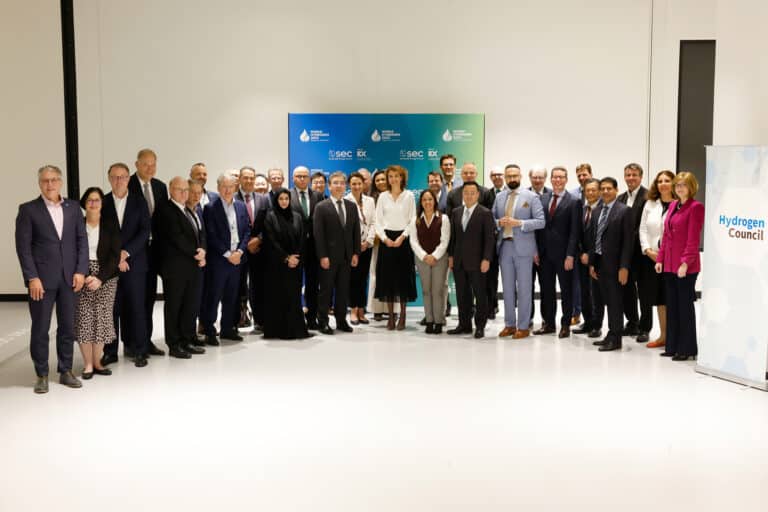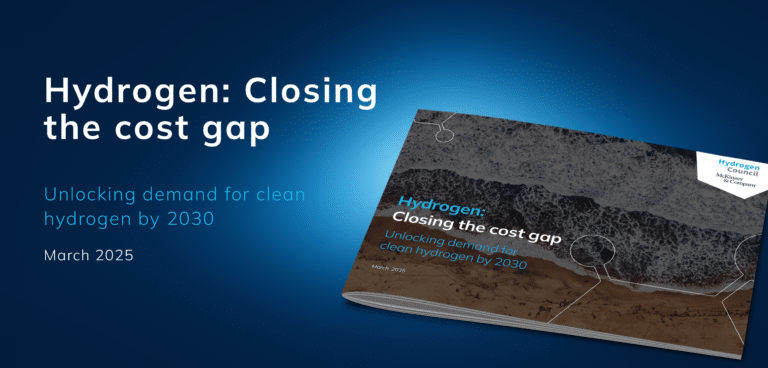Anglo American was one of 13 founding members of the Hydrogen Council when the global CEO-led initiative was created in 2017. Why did Anglo American want to be a part of the Hydrogen Council?
With our purpose of re-imagining mining to improve people’s lives and as a leading producer of hydrogen-enabling platinum group metals (PGMs), we have for many years sought to develop hydrogen-fuelled solutions not only for our own decarbonisation journey, but also to promote the hydrogen economy at large.
We had advocated for hydrogen in individual regions such as Europe, North America and Asia, so taking it to a global level seemed like a logical next step in order to build momentum at scale.
When our engagements with other corporate actors interested in realising hydrogen’s potential identified the opportunity to jointly establish the Hydrogen Council as a new CEO-led global advocacy initiative, we were delighted to become one of 13 founding members.
Through the Hydrogen Council, Anglo American is collaborating with players across key industrial sectors to help set up the right conditions and infrastructure to develop hydrogen-powered solutions, and driven initiatives to raise awareness of the multiple benefits of their more widespread adoption. Can you tell us more about the important work of the Council? Perhaps you have a couple of examples to share?
The Council’s work is critical to building linkages between different players in the hydrogen space, together enabling them to advocate for the full breadth of hydrogen’s potential.
Perhaps the best of example of success is that – since the Council’s founding – the hydrogen economy has become a mainstream issue and topic at all key global fora in a way that simply wasn’t the case in 2017.
As momentum for hydrogen increases around the world, costs will continue to fall and infrastructure will improve. Why is hydrogen such an attractive alternative energy source to Anglo American?
While hydrogen is an attractive energy source in a number of different use cases, it is particularly attractive to Anglo American in the decarbonisation of mobility. In May last year, we unveiled our nuGenTM hydrogen-powered ultra-class mine haul truck, capable of carrying a 290-tonne payload, at our Mogalakwena PGMs mine in South Africa.
Developed by our Technical Development team, in partnership with the specialist engineering technology company First Mode, the truck is part of nuGenTM’s Zero Emissions Haulage Solution (ZEHS) that includes the capability to produce green hydrogen in the future.
In the coming years, we are planning to convert or replace our current fleet of around 400 diesel-powered trucks, and to fuel them with green hydrogen. This will help us to remove up to 80% of diesel emissions at our open pit mines and move us closer to our 2040 carbon neutrality goals.
To support this target, we completed a deal – underpinned by a significant capital investment – that combined nuGenTM ZEHS with First Mode. The new business has retained the First Mode name as an independent business and is now prioritising scaling nuGenTM ZEHS at pace.
What are some of the recent hydrogen highlights for Anglo American?
In the South African context, we continue to progress projects that sit within the Department of Science and Innovation-led “hydrogen valley” initiative. A feasibility study published in October 2021 revealed the multiple benefits that the project could help unlock, including adding more than $3.9bn to the country’s GDP by 2050, and creating more than 14,000 jobs per year across the entire hydrogen value chain.
Our NuGenTM mine truck pilot already mentioned is a great example here, but we are also progressing other elements of the hydrogen valley, such as the hydrogen bus and truck-focused Rhynbow project. Beyond South Africa, we are also excited to have supported the deployment of hydrogen fuel cell electric vehicle (FCEV) taxis in Germany.
This initiative aims to raise awareness with the general public, government and other audiences of the range and refuelling speed qualities that FCEVs possess, and to underline that PGMs-enabled FCEVs are not a technology of tomorrow, but here today.
Where do you think the Hydrogen Council needs to focus its efforts in 2023?
As stated already, the case for hydrogen as an alternative energy source has gathered significant momentum since the Hydrogen Council was formed in 2017.
In 2023, the Hydrogen Council should continue advocating for the right conditions for increased global investment; explore the way in which the local deployment of hydrogen fuel cell technology can deliver socio-economic development in line with the UN Sustainable Development Goals and a Just Energy Transition; and otherwise continue delivering its function as the key global forum for clean hydrogen action.
The direction of travel is very positive, but we need to keep up all our efforts!
About The Hydrogen Council
The Hydrogen Council is a global CEO-led initiative that brings together leading companies with a united vision and long-term ambition for hydrogen to foster the clean energy transition. The Council believes that hydrogen has a key role to play in reaching our global decarbonization goals by helping to diversify energy sources worldwide, foster business and technological innovation as drivers for long-term economic growth, and decarbonize hard-to-abate sectors.
Using its global reach to promote collaboration between governments, industry and investors, the Council provides guidance on accelerating the deployment of hydrogen solutions around the world. It also acts as a business marketplace, bringing together a diverse group of 140+ companies based in 20+ countries across the entire hydrogen value chain, including large multinationals, innovative SMEs, and investors.
The Hydrogen Council also serves as a resource for safety standards and an interlocutor for the investment community, while identifying opportunities for regulatory advocacy in key geographies.
To find out more visit www.hydrogencouncil.com and follow us on Twitter @HydrogenCouncil and LinkedIn.
Joanna Sampson, Communications Manager, Hydrogen Council
joanna.sampson@hydrogencouncouncil.com



